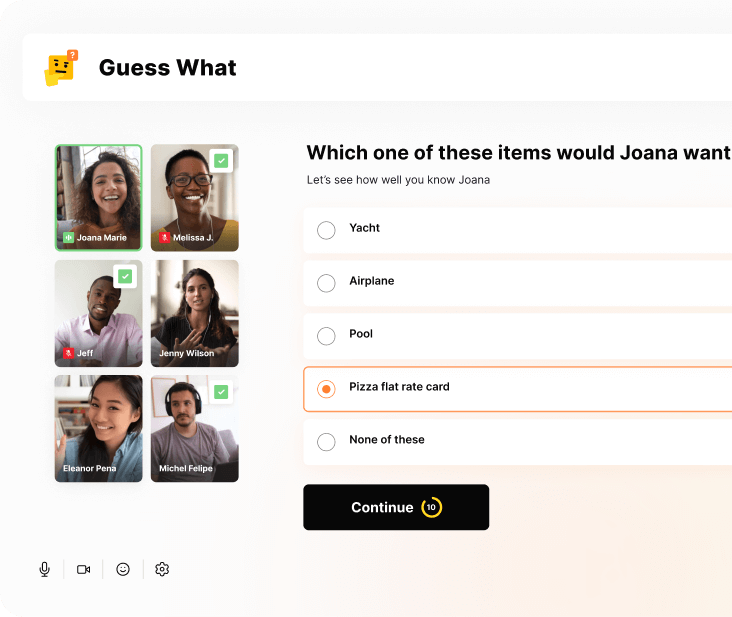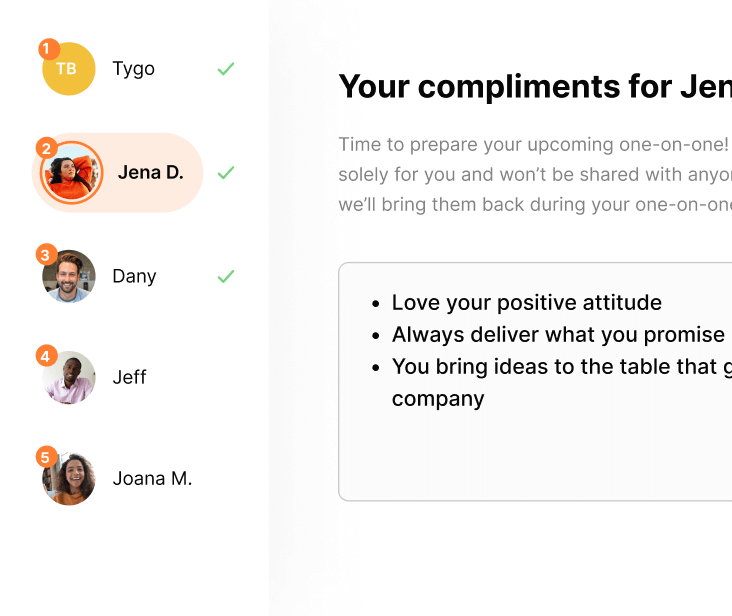Back to Blog
Facilitate team success: 8 accountability team building activities
One of the foundations of a successful team is accountability.
If you want a team that takes responsibility for its actions, strives to achieve goals, and takes ownership of its work, you need a team accountable to each other.
That means making your employees feel connected, investing time in team building activities, and focusing on exercises to build accountability.
Try out these options!
Team building activities to build accountability
Accountability starts with developing a culture that can support it.
These activities will help your team members build deeper bonds with each other, making it easier to handle conflict, give feedback, and own up to mistakes.
Write a personal story
Design a workshop where each team member writes a personal story that covers their strengths and weaknesses. This exercise is a great icebreaker when you’re first forming a team that encourages them to be vulnerable with each other.
Run a Fail Awards ceremony
Fail Awards are an event in which every team member has to describe their biggest mistake or failure of the year. The team votes on which mistake is the “biggest fail.” That team member wins an award. It’s a fun way to create a culture of open communication and normalize making mistakes.
Share fun facts and bond with a team quiz
Have your participants choose from a list of questions they’d like their coworkers to answer about them, before watching as they guess the right answer.
01. Yes
share-fun-facts-and-bond-with-a-team-quiz

Run a guided recognition activity
Have your participants choose from a list of questions they’d like their coworkers to answer about them, before watching as they guess the right answer.
01. Yes
run-a-guided-recognition-activity

Organize a virtual cooking class
Hire a professional chef to help your team cook a delicious lunch or dinner. May be difficult for co-workers with families. To find providers and get tips, read our blog about virtual cooking classes.
02. No
organize-a-virtual-cooking-class

Hire a stand-up comedian
Have your participants choose from a list of questions they’d like their coworkers to answer about them, before watching as they guess the right answer.
02. No
hire-a-stand-up-comedian

No items found
No items found
Table of contents
One of the foundations of a successful team is accountability.
If you want a team that takes responsibility for its actions, strives to achieve goals, and takes ownership of its work, you need a team accountable to each other.
That means making your employees feel connected, investing time in team building activities, and focusing on exercises to build accountability.
Try out these options!
Team building activities to build accountability
Accountability starts with developing a culture that can support it.
These activities will help your team members build deeper bonds with each other, making it easier to handle conflict, give feedback, and own up to mistakes.
Write a personal story
Design a workshop where each team member writes a personal story that covers their strengths and weaknesses. This exercise is a great icebreaker when you’re first forming a team that encourages them to be vulnerable with each other.
Run a Fail Awards ceremony
Fail Awards are an event in which every team member has to describe their biggest mistake or failure of the year. The team votes on which mistake is the “biggest fail.” That team member wins an award. It’s a fun way to create a culture of open communication and normalize making mistakes.
Implement peer review
Peer review is a standard process in programming roles, but it’s a great technique to build accountability in every position, including virtual ones. Regularly giving and receiving feedback from your teammates is challenging but will improve your team culture.
Survival leadership on an island
Split up into groups and nominate a leader for each group. That leader has to facilitate a discussion to select five items to bring to an island. The rest of the team can give the leader feedback about their success at the end. Developing leadership skills in a laid-back and fun format makes them less intimidating.
Feedback bombardment
Each team member has a window where they receive feedback. During that time, everyone else describes their most significant contribution to the team and where they need to improve for the team’s overall benefit. This is a tough but effective way to enhance critical thinking and communication skills as a team.
Role-play typical scenarios at work
Choose some imaginary scenarios that are relatable to your team. Assign two roles to two team members, such as a supervisor checking in about a project’s progress with a team member. When they act it out, the other team members respond and explain what they liked or didn’t like about how the supervisor handled the situation. The exercise is a great way to train accountability in action.
Take a personality test together
Personality tests can help reduce conflict and personality clashes, especially if you want to improve problem-solving in your team. Ask everyone to discuss their results with each other, covering how their personality manifests itself in their work.
Want some more ideas? Try out some team building activities for work or these activities for free.
How to promote accountability in a team
Promoting accountability in your team is one aspect of developing a cohesive team.
These are some ways to get started:
- Invest in regular team building. Spending time together as a team is essential in building any culture. Doing some activities on a monthly cadence is often a good idea. Tools like Gomada that are made for remote teams and suggest a tailored set of activities for your team can take that to the next level.
- Develop a strategy and goals for team building. Team building doesn’t exist in a vacuum. It’s important to approach it with the right mindset by setting specific goals and selecting methods that work for your team.
- Build trust and psychological safety. Trust is the foundation of accountability. If your team knows the other members have their back, they’ll have an easier time taking ownership of their successes and failures.
- Foster radical candor. A high-performing team means everyone is direct with feedback because they want to support others and help them succeed.
- Set clear expectations. This includes setting deadlines, assigning tasks, and defining roles and responsibilities. As a manager, you want to create an environment where everyone knows what to expect. Only then can they hold each other accountable.
- Adopt a system of collaboration. Look into how decisions are made across your team and find opportunities to encourage people to work together. Team workshops are a great facilitator of that.
Facilitate team success with accountability
Accountability is only a single aspect of successful teams, but it’s essential. Teams that feel ownership push each other to be more productive, perform better and set ambitious goals.
Looking for more ways to develop your team?
Know the latest stats on employee engagement
Implement an employee engagement platform
Try out some engagement apps and solutions
Subscribe to get our latest updates
Subscribe to get our latest updates
.png)



.jpg)

.jpg)